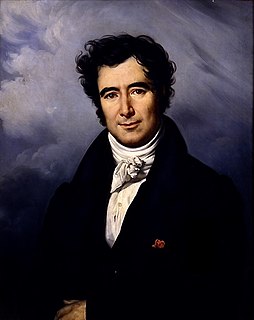A Quote by Honore de Balzac
This surface good-nature which captivates a new acquaintance and is no bar to treachery, which knows no scruple and is never at fault for an excuse, which makes an outcry at the wound which it condones, is one of the most distinctive features of the journalist. This camaraderie (the word is a stroke of genius) corrodes the noblest minds; it eats into their pride like rust, kills the germ of great deeds, and lends a sanction to moral cowardice.
Related Quotes
There is one vice of which no man in the world is free; which every one in the world loathes when he sees it in someone else; and of which hardly any people, except Christians, ever imagine that they are guilty themselves. […] There is no fault which makes a man more unpopular, and no fault which we are more unconscious of in ourselves.[…]The vice I am talking of is Pride or Self-Conceit: and the virtue opposite to it, in Christian morals, is called Humility.
Destiny ... a word which means more than we can find any definitions for. It is a word which can have no meaning in a mechanical universe: if that which is wound up must run down, what destiny is there in that? Destiny is not necessitarianism, and it is not caprice: it is something essentially meaningful. Each man has his destiny, though some men are undoubtedly "men of destiny" in a sense in which most men are not.
Good character is that quality which makes one dependable whether being watched or not, which makes one truthful when it is to one's advantage to be a little less than truthful, which makes one courageous when faced with great obstacles and which endows one with the firmness of' wise self-discipline.
The Greek word euphuia, a finely tempered nature, gives exactly the notion of perfection as culture brings us to perceive it; a harmonious perfection, a perfection in which the characters of beauty and intelligence are both present, which unites "the two noblest of things" - as Swift most happily calls them in his Battle of the Books, "the two noblest of things, sweetness and light."
Society will develop a new kind of servitude which covers the surface of society with a network of complicated rules, through which the most original minds and the most energetic characters cannot penetrate. It does not tyrannise but it compresses, enervates, extinguishes, and stupefies a people, till each nation is reduced to nothing better than a flock of timid and industrious animals, of which the government is the shepherd.
The word 'We' is as lime poured over men, which sets and hardens to stone, and crushes all beneath it, and that which is white and that which is black are lost equally in the grey of it. It is the word by which the depraved steal the virtue of the good, by which the weak steal the might of the strong, by which the fools steal the wisdom of the sages.
The world is filled with the proverbs and acts and winkings of a base prudence, which is a devotion to matter, as if we possessedno other faculties than the palate, the nose, the touch, the eye and ear; a prudence which adores the Rule of Three, which never subscribes, which never gives, which seldom lends, and asks but one question of any project,--Will it bake bread?
There are five dangerous faults which may affect a general: recklessness, which leads to destruction; cowardice, which leads to capture; a hasty temper, which can be provoked by insults; a delicacy of honour, which is sensitive to shame; over-solicitude for his men, which exposes him to worry and trouble.
The shortness of life, which we all discuss, but which is very clear to me at the moment, makes keeping and spreading a joyful peace more crucial than ever before. Let us keep our minds on what matters, which is our work, which is astonishment and gratitude. From this quiet magic comes a power for all other new years wishes to come true.
A good poem is a tautology. It expands one word by adding a number which clarify it, thus making a new word which has never before been spoken. The seedword is always so ordinary that hardly anyone perceives it. Classical odes grow from and or because, romantic lyrics from but and if. Immature verses expand a personal pronoun ad nauseam, the greatest works bring glory to a common verb. Good poems, therefore, are always close to banality, over which, however, they tower like precipices.
A time will come when the science of destruction shall bend before the arts of peace; when the genius which multiplies our powers, which creates new products, which diffuses comfort and happiness among the great mass of the people, shall occupy in the general estimation of mankind that rank which reason and common sense now assign to it.







































